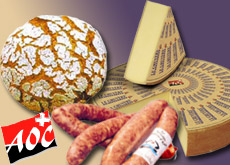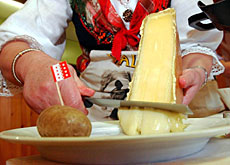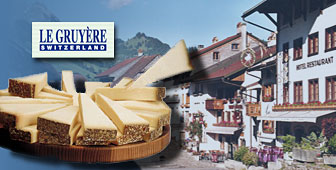Products line up for seal of approval

Switzerland is belatedly adopting the European system of certification to guarantee the origin and quality of its traditional agricultural and food products.
Initial reactions have been positive, not least because the new classifications have led to an increase in sales and offer protection against foreign imitators.
After wine, Protected Designation of Origin (PDO) status – similar to the French “appellation d’origine contrôlée” (AOC) quality label – is being extended to other Swiss agricultural and food products.
PDO certification guarantees that products are made entirely in their region of origin and in compliance with strict quality criteria.
The first Swiss food product to be officially registered – in 2000 – was Etivaz, the cheese from the Vaud Alps with its characteristic hazelnut flavour, which is smoked over a spruce-wood fire.
Since then, a further 11 products have been authorised to display the PDO label. They include the Vacherin Mont D’Or cheese and aromatic Mund saffron.
Meanwhile, another four products, including cured meat from cantons Graubünden and Valais, have been granted Protected Geographical Identification (PGI) status.
This signifies that, though produced in accordance with traditional procedures, not all the ingredients come from the region of origin, or not all the processing is done there.
The number of products registered in this way is expected to double or treble in the next two or three years. Around ten new candidates are already on the federal PDO/PGI waiting list.
Many advantages
The advantages of certification are obvious. The prime beneficiaries are consumers, who often have no idea what they are eating and are increasingly alarmed by health scares arising from the adulteration of industrially processed foods.
Producers, too, have much to gain. By obtaining a label guaranteeing the origin of their product, they can raise their market profile and increase consumer confidence.
“To protect the reputation and promote sales of their PDO products, producers’ associations are keen to lay down very high quality control standards,” insists Frédéric Brand, who is responsible for the PDO/PGI register at the Federal Office for Agriculture.
The results have been reassuring: within a year, Vacherin Mont d’Or , for example, increased its sales by 20 per cent; the production of rye bread from the Valais doubled; and it was impossible to keep up with demand for Geneva cardoons (a close relative of the globe artichoke).
A further advantage of PDO and PGI labelling is that it affords its users legal protection against imitations and fakes.
The removal of customs barriers worldwide has made it possible for products to reach ever-wider markets, but it also increases the likelihood of unfair competition.
Global marketplace
“You may be for or against globalisation,” says Jacques Henchoz, president of the association promoting the PGO/PGI labels, “but to survive in the global marketplace, farmers have to learn to adapt.
“Although in some parts of the world farmers are in a position to exploit a thousand hectares of land efficiently, in our valleys all they can do is develop high-quality products which will win over consumers, precisely because they bring them the flavour of the mountains.”
To safeguard the unique quality of a product, it must be produced following the very strictest rules.
In the case of Etivaz cheese, for example, the cows may be fed only on grass, so that the cheese does not lose the taste of Alpine flora. It must also be made according to the traditional, farm-based procedures, over a wood fire.
“What we are doing is quite irrational,” says Henchoz. “It would be far more logical to transform the milk into cheese at a single, large production facility. But if we did this, the milk would lose its fat molecules during transport.”
“In the beginning, many producers did not understand the point of all the hard work, and the financial investment. But, now they have this quality label, they have become aware of the value of their product.”
Swiss behind the times
In France, the importance of certification was understood long ago: the AOC system was introduced in 1935 to protect regional wines from a whole host of imitators.
The European Union adopted the French model in 1992, effectively coinciding with the introduction of the Single Market, which freed up the movement of goods among the 15 member states.
Almost 700 products, not counting wines, now feature on the European PDO register.
In Switzerland, it was initially felt that there was no need for such a system as long as Swiss agriculture was bolstered by subsidies and a virtually protectionist regime.
Action was delayed until the late 1990s, when negotiations promoted by the World Trade Organization and bilateral agreements with the EU made it inevitable that Swiss markets would have to become more open.
Meanwhile, it has become increasingly difficult to protect Swiss producers against copycat products made in other European countries, as in the case of Gruyère and Emmental cheeses.
Unfortunately, it is likely that negotiations with the EU to ensure mutual recognition of PDO products will take a long time, partly because the 15 member countries have not yet resolved all their own internal disagreements, not least over the status of feta cheese.
“We have lost a lot of time, and with it the chance of certification for some of our products,” says Frédéric Brand.
“It takes years to persuade producers to adopt a common designation – or to convince them that they will have to give it up if they are not operating in the region of origin.”
swissinfo, Armando Mombelli
1935: France introduces the first AOC designations to safeguard its wines from imitation.
1990: the system of certification is extended to other agricultural and food products.
1992: the European Union adopts the French model.
2000: Switzerland grants PDO status for the first time to Etivaz cheese.
2004: 16 Swiss agricultural and food products are granted PDO or PGI status.
Protected Designation of Origin (PDO) status guarantees that every phase in the production and processing of an agricultural or food product takes place in a given geographical region.
Protected Geographical Indication (PGI) status signifies that at least one of the phases of production takes place in a specified geographical area.
For wines, PDO certification was introduced in several wine-growing areas of Switzerland in the 1980s.
But the federal system of regulation has not been adopted by all the Swiss cantons.

In compliance with the JTI standards
More: SWI swissinfo.ch certified by the Journalism Trust Initiative



You can find an overview of ongoing debates with our journalists here. Please join us!
If you want to start a conversation about a topic raised in this article or want to report factual errors, email us at english@swissinfo.ch.